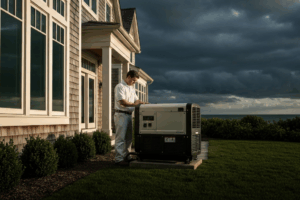
Navigating the Texas State Electrical Code & TDLR Rules
Navigating the Texas State Electrical Code & TDLR Rules
The Core Framework: TDLR and the NEC 2023
In Texas, electrical safety and licensing are governed by a clear hierarchy. At the top is the TDLR, the state body responsible for issuing licenses and enforcing the rules. The primary legal statute is the Texas Electrical Safety and Licensing Act, which is further detailed in Texas Administrative Code Chapter 73.
The technical foundation for all electrical work is the National Electrical Code (NEC). TDLR officially adopted the 2023 edition of the NEC, making it the minimum standard for any non-exempt electrical work started on or after September 1, 2023. This means everything from service equipment labeling to cable installation must follow these updated guidelines.
- Impact of NEC 2023: This update introduced significant changes. For example, learning how to comply with 2023 NEC service equipment labeling requirements is crucial for passing inspections.
- Municipal Electrical Amendments: While the state sets the minimum standard, municipalities can adopt their own local amendments. Always check with the local authority having jurisdiction (AHJ) for specific electrical permit requirements and code modifications in your area.
- Workplace Safety: While the TDLR mandates code compliance for installations, it recommends the NFPA 70E standard as a “best practice” for workplace electrical safety. This is a critical piece of knowledge for any working electrician.
Understanding Texas Electrician License Types and Requirements
Texas doesn’t have a one-size-fits-all license. The TDLR issues distinct licenses with different scopes of work, experience requirements, and responsibilities. The rules for a journeyman electrician are different from those for a master electrician or a residential wireman. Understanding these differences is essential for legal and safe operation.
| License Type | Scope of Work | Key Requirements to Obtain License |
|---|---|---|
| Master Electrician | Plan, design, install, and supervise all types of electrical work. Can act as the Master of Record for an Electrical Contractor. | Must hold a Journeyman license for at least two years, document 12,000 hours of on-the-job training, and pass the Master Electrician exam. |
| Journeyman Electrician | Install and repair electrical systems under the supervision of a Master Electrician. | Must document 8,000 hours of on-the-job training as a licensed apprentice and pass the Journeyman electrician requirements exam. |
| Residential Wireman License | Perform electrical work only in single-family and multifamily dwellings up to four stories high. Ideal for a residential electrician. | Must document 4,000 hours of on-the-job training and pass the Residential Wireman exam. |
| Apprentice Electrician | Assist in electrical installations while learning the trade. Must work under the supervision of a licensed Master Electrician. | Must be at least 16 years old. Often the first step after attending an electrician school. |
TDLR License Renewal and Continuing Education
Keeping your license active requires annual renewal. According to the TDLR, nearly all individual license holders—including Master, Journeyman, Residential Wireman, and Apprentice electricians—must complete 4 hours of electrical continuing education Texas each year before their license expires. These hours are not optional; failing to complete them is a direct path to a lapsed license and potential TDLR enforcement actions.
According to Texas Administrative Code §73.25(c), your 4-hour course must cover specific topics:
- At least 2 hours on the current National Electrical Code (NEC)
- At least 1 hour on Texas state laws and rules (Chapter 1305 and Chapter 73)
- At least 1 hour on safety, with an emphasis on NFPA 70E
The easiest way to meet this requirement is with TDLR-approved online electrical courses. These courses allow you to complete your hours at your own pace and automatically report your completion to the TDLR, simplifying your TDLR license renewal process. It is important to note that Electrical Contractors are exempt from CE requirements, but the Master Electrician they employ is not.
Operating as a Contractor: TECL and Advertising Rules
If you run your own business, you must hold an Electrical Contractor license. A key responsibility for contractors is displaying your license number, often called a TECL number. According to TDLR Rule 73.51 and Occupations Code 1305.166, an Electrical Contractor must display their business name and license number on both sides of every work vehicle. The lettering must be at least two inches high and in a contrasting color, with the license number preceded by “TECL”.
This rule extends to paperwork. Your TECL number, business name, and address must be on all invoices, proposals, and contracts. These regulations are enforced by the TDLR and overseen by the Electrical Safety and Licensing Advisory Board to ensure consumer protection and professionalism in the trade.
Related Resources
- How Has NEC 2023 Changed Accessibility Rules for Circuit Breakers and Switches?
- How Have 2023 NEC Updates Changed NM and NMC Cable Installation Rules?
Stay Ahead of the Curve
The electrical industry in Texas is constantly evolving. Staying current with the state of texas electrical code, TDLR regulations, and continuing education isn’t just a requirement—it’s a smart career move. By embracing these standards, you protect your license, your clients, and your professional reputation.
Ready to complete your annual renewal? ExpertCE offers TDLR-approved courses designed for busy Texas electricians. Browse our courses today to stay compliant and get back to work faster.
Disclaimer: The information provided in this educational content has been prepared with care to reflect current regulatory requirements for continuing education. However, licensing rules and regulations can vary by state and are subject to change. While we strive for accuracy, ExpertCE cannot guarantee that all details are complete or up to date at the time of reading. For the most current and authoritative information, always refer directly to your state’s official licensing board or regulatory agency.
NEC®, NFPA 70E®, NFPA 70®, and National Electrical Code® are registered trademarks of the National Fire Protection Association® (NFPA®)



